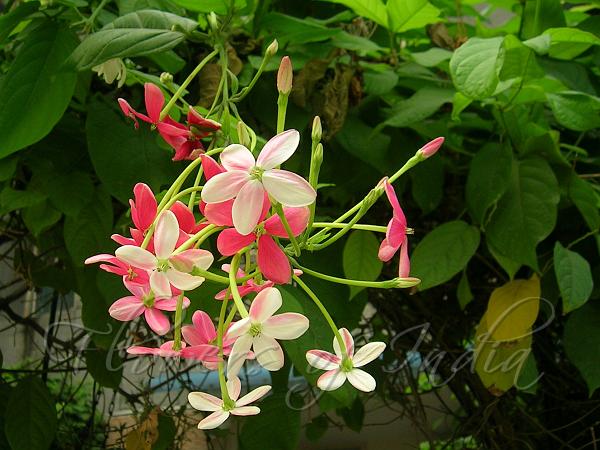|
| Rangoon Creeper |
|

|

| File size | 627103 |
| Original date | 8/25/07 6:58 AM |
| Resolution | 2048 x 1536 |
| Flash | Flash did not fire, auto |
| Focal length | 5.4mm |
| Exposure time | 1/100s |
| Aperture | 2.8 |
| Focus Distance | |
| Metering Mode | Partial |
| Camera make | NIKON |
| Camera model | E3700 |
| Sensor type |
|
|
|
Photo: |
Botanical name: Combretum indicum Family: Combretaceae (Rangoon creeper family)
Synonyms: Quisqualis indica, Quisqualis grandiflora, Quisqualis sinensis
Synonyms: Quisqualis indica, Quisqualis grandiflora, Quisqualis sinensis
Rangoon creeper is the most common vine in Delhi. It is not uncommon
to see the creeper rooted only in a small hole in cemented groud,
but the vine thriving and climbing high. Clusters of fragrant white
pendulous trumpets open white then change to pink, red and finally a
deep maroon. A vigorous twining climber blooming profusely throughout
summer that can reach as much as 70 feet in tropical climates. This
plant needs support for growing and is very useful in covering fences,
supports, and walls. The fragrant white flowers grow in pendent racemes,
quickly changing to pink then red, making a spectacular show. The growth
rate is generally fast, and the plant does not make heavy fertilizer
demands. Rangoon creeper does like medium to bright light. Under
good conditions it will be necessary to prune the plant to keep it in
bounds. Rangoon creeper
is found in thickets or secondary forests of the Philippines, India and
Malaysia. It has since been cultivated widely in the gardens as an easy
to grow plant.
Medicinal uses: Decoctions of the root, seed or fruit can be used as
antihelmintic to expel parasitic worms or for alleviating diarrhea. Fruit
decoction can also be used for gargling. The fruits are also used to
combat nephritis. Leaves can be used to relieve pain caused by fever. The
roots are used to treat rheumatism. Flowers are used to relieve headache.
Decoctions of the root, seed or fruit can be used as
antihelmintic to expel parasitic worms or for alleviating diarrhea. Fruit
decoction can also be used for gargling. The fruits are also used to
combat nephritis. Leaves can be used to relieve pain caused by fever. The
roots are used to treat rheumatism. Flowers are used to relieve headache.
Medicinal uses:
 Decoctions of the root, seed or fruit can be used as
antihelmintic to expel parasitic worms or for alleviating diarrhea. Fruit
decoction can also be used for gargling. The fruits are also used to
combat nephritis. Leaves can be used to relieve pain caused by fever. The
roots are used to treat rheumatism. Flowers are used to relieve headache.
Decoctions of the root, seed or fruit can be used as
antihelmintic to expel parasitic worms or for alleviating diarrhea. Fruit
decoction can also be used for gargling. The fruits are also used to
combat nephritis. Leaves can be used to relieve pain caused by fever. The
roots are used to treat rheumatism. Flowers are used to relieve headache.
| Identification credit: Radhika Vathsan | Photographed in Delhi & Maharashtra. |
• Is this flower misidentified? If yes,